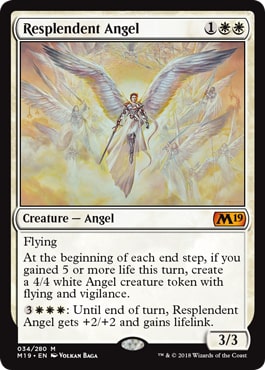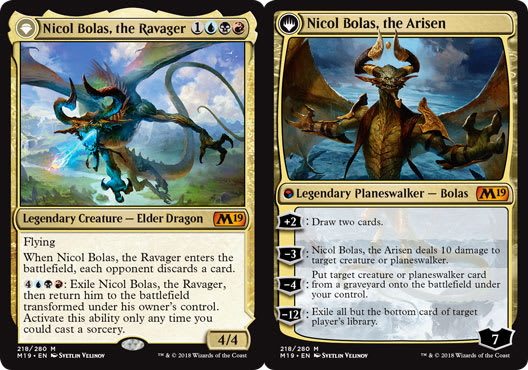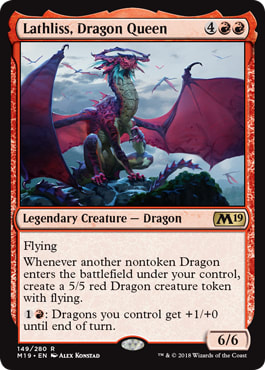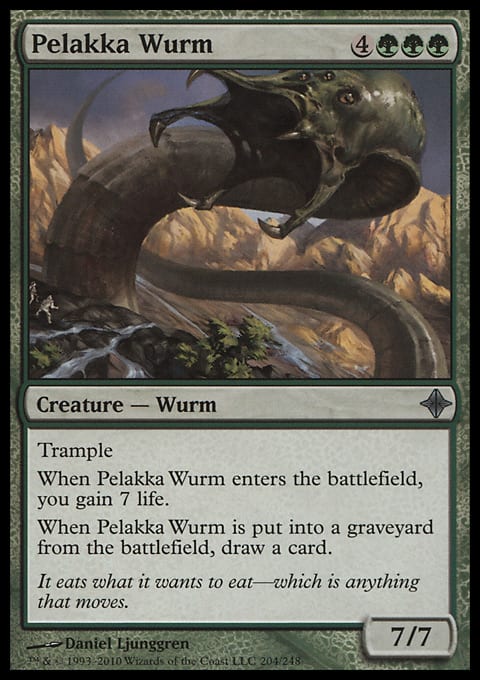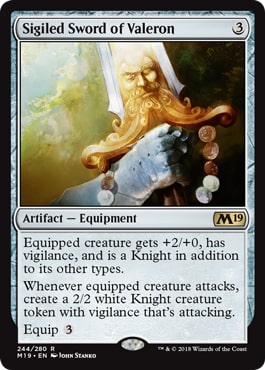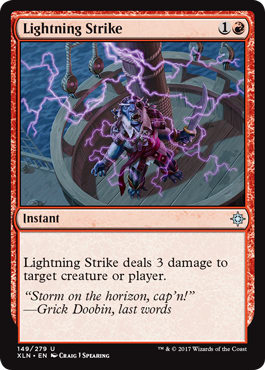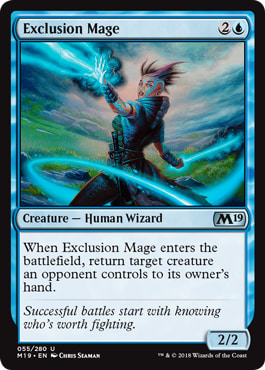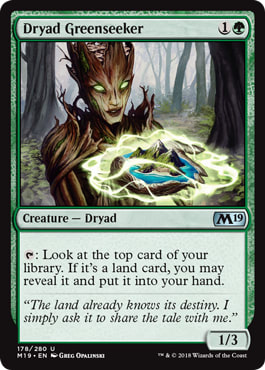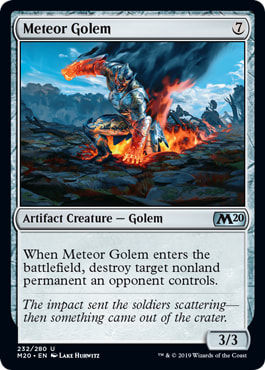While I am a Pauper enthusiast at heart, my most competitive format as a Magic player is sealed deck.
Two weeks into the format on MTGO, so far my sealed deck record is 32-17 or about a 65% win percentage. While this may not feel terribly impressive for regular MTGO grinders, (and honestly it is fairly close to the break-even rate for MTGO Friendly Sealed Leagues), it does mean I've gained a good eye for what cards you should consider when building your Magic 2019 sealed decks.
There is a lot of wisdom to be gained when you play sealed deck in observing not just which cards were the most powerful, but also which are the cards that the community consensus seems to be saying "These cards are worthwhile to play!" So we're going to examine the bombs and the cards that pull you into specific colors, but also the key commons since they will still make up a good half or more of your 40. We'll also look at the cards that have the biggest delta between draft and sealed, both cards that might have overlooked and also draft cards that lose a lot of value when we get into the grindy world of sealed deck.
First off, let's grade all of the Rares and Mythics. Generally, you should try to play as many bombs as possible regardless of their supporting cast of interchangeable commons. Most decks can support two colors with a splash, so try not to leave a A or a B Rare or Mythic on the sideline unless you can't support the card with your mana. Any third color bomb with only a single off-colored mana in its casting cost is probably worth your consideration.
Mythics
A: Resplendent Angel, Nicol Bolas, the Ravager, Palladia-Mors, the Ruiner, Ajani, Adversary of Tyrants, Vivien Reid, Vaevictis Asmadi, the Dire, Tezzeret, Artifice Master
(N.B. The Green elder dragons get a bump because you will have an easier time ramping up to their mana cost and into three colors if you are base Green.)
B: Bone Dragon, Chromium, the Mutable
D: Sarkhan, Fireblood, Liliana, Untouched by Death
F: Crucible of Worlds, Scapeshift, Apex of Power, Omniscience
Black Rares
A: N/A
B: Isareth the Awakener, Demon of Catastrophes, Graveyard Marshal, Liliana's Contract
C: Death Baron
D: Open the Graves, Phylactery Lich
F: Fraying Omnipotence, Infernal Reckoning.
Red Rares
A: Lathliss, Dragon Queen, Demanding Dragon, Banefire
B: Spit Flame, Sarkhan's Unsealing, Dismissive Pyromancer
C: Dark-Dweller Oracle, Goblin Trashmaster
D: N/A
F: Alpine Moon
White Rares
A: Leonin Warleader, Cleansing Nova
B: Lena, Selfless Champion, Mentor of the Meek, Valiant Knight
C: Remorseful Cleric, Ajani's Last Stand
D: Suncleanser
F: Isolate
Blue Rares
A: Djinn of Wishes, Windreader Sphinx
B: Mystic Archaeologist, Patient Rebuilding
C: Sai, Master Thopterist, Supreme Phantom
D: Metamorphic Alteration, One With The Machine
F: Mistcaller
Green Rares
A: Pelakka Wurm
B: Goreclaw, Terror of Qal Sisma, Thorn Lieutenant, Runic Armasaur
C: Hungering Hydra, Vivien's Invocation, Prodigious Growth
Artifacts and Lands
B: Chaos Wand, Dragon's Hoard, Transmogrifying Wand
C: N/A
F: Desecrated Tomb, Amulet of Safekeeping, Detection Tower
Uncommons That Matter
These are the uncommons that are generally better than the commons available in any color. If you can build your deck with 10 or more quality uncommons and rares than you are probably in the right combination of colors.
Black: Murder, Vampire Sovereign, Gravedigger
Red: Lightning Strike, Volcanic Dragon, Siegebreaker Giant
White: Herald of Faith, Hieromancer's Cage
Blue: Exclusion Mage, Horizon Scholar, Sleep, Switcheroo, Sift, Departed Deckhand
Green: Dryad Greenseeker, Reclamation Sage, Vine Mare, Declare Dominance
Artifact: Meteor Golem, Arcane Encyclopedia
Multicolored Signpost Uncommons: Psychic Symbiont, Regal Bloodlord, Poison-Tip Archer, Skyrider Patrol, Draconic Disciple, Enigma Drake, Brawl-Bash Ogre.
I care much less for the ![]()
![]() ,
, ![]()
![]() and
and ![]()
![]() uncommon because they fit tighter in draft themes that you can't rely on having a critical mass towards in sealed deck, namely tokens, enchantments and artifacts. The other seven are strong enough cards on their own with only a bare minimum of on-theme support.
uncommon because they fit tighter in draft themes that you can't rely on having a critical mass towards in sealed deck, namely tokens, enchantments and artifacts. The other seven are strong enough cards on their own with only a bare minimum of on-theme support.
Commons Removal Spells That Really Matter In Each Color
Black: Lich's Caress, Strangling Spores
White: Luminous Bonds
Blue: Essence Scatter
Green: Rabid Bite
You should always play these cards if you are in these colors. You should often splash for them if you can support the splash, and you are light on removal. And you need to strongly consider having access to some removal in your colors, ideally no fewer than 3-4 of these or the uncommon / rares.
Commons and Uncommons That Improve Significantly In Sealed Deck
Black: Mind Rot, Macabre Waltz
Red: Sparktongue Dragon
White: N/A
Blue: Divination, Cancel
Green: Gift of Paradise, Colossal Dreadmaw, Plummet
Artifacts: Skyscanner, Manalith
Lands: All of the Common ETBT Dual Lands
All of these are close to auto-include if I am in their colors and can support with mana. What these ten cards have in common is that they all are much better in games that last ten turns than five.
Filling Out Your Mana Curve In Each Color
(Undesirable Playables in Italics)
Black
- Diregraf Ghoul, Vampire Neonate, Stitcher's Supplier
- Reassembling Skeleton, Child of Night, Doomed Dissenter, Walking Corpse
- Plague Mare, Skymarch Bloodletter, Ravenous Harpy, Hired Blade
- Gravedigger, Skeleton Archer, Fell Specter, Two-Headed Zombie
- Epicure of Blood
- Bogstomper
Red
- Goblin Motivator
- Lightning Mare, Viashino Pyromancer, Goblin Instigator
- Boggart Brute, Dragon Egg, Onakke Ogre, Guttersnipe
- Volley Veteran, Havoc Devils, Hostile Minotaur, Inferno Hellion
- Siegebreaker Giant, Sparktongue Dragon, Fire Elemental
- Volcanic Dragon
White
- Leonin Vanguard, Novice Knight, Rustwing Falcon
- Ajani's Pridemate, Cavalry Drillmaster, Daybreak Chaplain, Oreskos Swiftclaw
- Militia Bugler, Pegasus Courser, Shield Mare, Trusty Packbeast, Loxodon Line Breaker
- Gallant Cavalry, Star-Crowned Stag, Aethershield Artificer, Dwarven Priest
- Herald of Faith, Angel of Dawn
- Knight of the Tusk
Blue
- Gearsmith Prodigy
- Departed Deckhand, Omenspeaker, Surge Mare, Wall of Mist
- Exclusion Mage, Aven Wind Mage, Aviation Pioneer, Skilled Animator, Tolarian Scholar
- Snapping Drake, Scholar of Stars
- Salvager of Secrets
- Horizon Scholar, Frilled Sea Serpent
Green
- Wall of Vines
- Druid of the Cowl, Dryad Greenseeker, Greenwood Sentinel, Highland Game
- Elvish Rejuvenator, Centaur Courser, Ghirapur Guide, Reclamation Sage, Daggerback Basilisk
- Vine Mare, Giant Spider, Bristling Boar, Druid of Horns
- Vigilant Baloth, Rhox Oracle, Thornhide Wolves
- Colossal Dreadmaw
- Ghastbark Twins
Artifact
- Field Creeper, Diamond Mare, Suspicious Bookcase
- Gargoyle Sentinel, Skyscanner
- Gearsmith Guardian
- Meteor Golem
Some advice on choosing your curve filler
- Avoid creatures that will be blanked by the opponent's creatures of one higher CMC. I see far too many one and 2-drops played in decks that are not streamlined two-color aggro decks. Instead try to only play one and 2-drops that will: a. Be great later in the game; b. Support your bombs, like Doomed Dissenter if you have a Demon of Catastrophes or c. Effectively trade with your opponents early drops to prolong the game.
- In sideboarding, choose creatures that will either trade up with your opponent's curve or will blank their earlier play. For example, Oreskos Swiftclaw is a nice sideboard curve filler against Centaur Courser and Giant Spider matches up very nicely against Skymarch Bloodletter.
- Power boosting Auras like Oakenform are good sideboard additions against decks relying on damage based removal like Electrify and Rabid Bite.
- Against Bomb heavy decks, add more discard and counters like Mind Rot and Essence Scatter, especially if you're light on removal. Or if you can't beat their top end, think about lowering your curve into a tighter two-color aggro deck, or add cards that can exploit your opponent needing to tap out for their big 6 mana play like Disperse or Act of Treason.
- While most sealed play is slow, you still need to be doing something relevant typically by turn three. If your 3-drop slot is a ramp spell like Manalith or Elvish Rejuvenator, consider some more defensive 2-drops since it's doubtful you will have a board affecting creature until turn four.
Choosing Your Land Count
I generally prefer 18 lands in sealed deck. I will make exceptions if I either have a streamlined two-color aggro deck or I am lacking on a good mana sink like Arcane Encyclopedia. I have been happy playing as many as 20 total mana sources in Magic 2019 sealed, especially if 2-3 of them are mana ramp creatures like Druid of the Cowl and Elvish Rejuvenator. In a powerful 3-color deck with lots of bombs, like Nicol Bolas, the Ravager and expensive removal like Lich's Caress, 18 lands plus a Manalith or a Dragon's Hoard is a good mix.
Play or Draw?
I default to choosing to draw in sealed deck. But reasons that should influence your decision are:
- Cheap removal like Shock means you will be up a card if you and your opponent are spending your early turns just trading resources, so you should choose to draw.
- Divination on turn three effectively makes up for the lost card resource of going first, but puts you ahead on development. This is a card that leads me to choose to play.
- Greedy mana bases trying to support three colors and attempting to cast multiple double pip cards like Isareth the Awakener into Vine Mare should choose to draw. You need to cast your spells.
- If your opponent is on a streamlined two color Aggro deck, not only should you lower your curve to match theirs, but you should play first to take the development initiative away from them. If it's right for one player to go first then it's right for both players to go first.
I hope you enjoy the "fundamentals magic" that is Magic 2019 Sealed, whether it is at a Grand Prix or just the Friendly Sealed Leagues on Magic Online. See you there!














